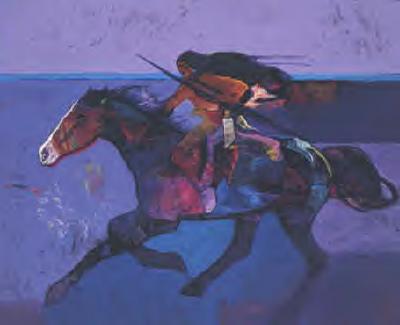|
|
Canku Ota |
|
|
(Many Paths) |
||
|
An Online Newsletter Celebrating Native America |
||
|
april 7, 2001 - Issue 33 |
||
|
|
||
|
Horse Trainer Relates Experience |
||
|
by Ron Jackson The Oklahoman |
||
|
art American Survivor by John Nieto |
 Lynne
Ferguson has always maintained an emotional tie to her native Comanche people, despite being adopted out of the
tribe as a child. This week, that emotional tie has grown stronger, even though she's 2,000 miles away on the Port
Madison reservation in Washington. Lynne
Ferguson has always maintained an emotional tie to her native Comanche people, despite being adopted out of the
tribe as a child. This week, that emotional tie has grown stronger, even though she's 2,000 miles away on the Port
Madison reservation in Washington. Ferguson received word that the Comanche Nation is embarking on an anti-drug program that plans to lure children from the streets and into the tribe's storied horse culture. The tribe's recent purchase of 50 wild mustang yearlings has more than a familiar ring to Ferguson, who runs a similar program for the Suquamish Tribe near Seattle. "They're in for a lot of real good rewards," Ferguson said. "I've seen kids who were into drugs, alcohol, violence and gangs, and I've seen a big difference in the way they dealt with things and the way they communicated with each other. "All because of what they learned by training horses." The Suquamish horse program didn't become an official tribal program until 1998. Prior to that time, Lynne and her husband, Roger, began working privately with horses to entertain the six children they were raising. The Fergusons used traditional Comanche horse-training methods in which body language -- not ropes and halters -- were used to tame their wild horses. Neighborhood children soon became involved by the dozens. "The whole thing just got kind of big," Ferguson recalled. "Eventually, the tribe asked us to come talk to them about the horses. A lot of the at-risk kids -- kids they had had problems with -- were now staying out of trouble because they were involved in our volunteer program. They wanted to know what we were doing. "So we made it a tribal program." Today, Ferguson says there are 129 Suquamish children enrolled in the program in a tribe of 900 people. Participants range from 3 to 20 years in age. Three tribes in Minnesota, Oregon and Washington have since patterned horse programs after the one created on the Suquamish reservation. "The Comanches' program is the fourth one we have ever heard of," Ferguson said. "I'm so excited for them because I know what kind of impact this program can have on children." Ferguson recalled one day a child in her program nearly came to blows with a classmate over a petty argument. The boy composed himself before any fists were unleashed. "The boy stopped," Ferguson related. "He said, 'I can't get into a fight. I have horse class today.' " |
|
Children of
the Tribe |
|
Suquamish Tribe |
|
|
||
|
|
||
| Canku Ota is a free Newsletter celebrating Native America, its traditions and accomplishments . We do not provide subscriber or visitor names to anyone. Some articles presented in Canku Ota may contain copyright material. We have received appropriate permissions for republishing any articles. Material appearing here is distributed without profit or monetary gain to those who have expressed an interest. This is in accordance with Title 17 U.S.C. section 107. | ||
|
Canku Ota is a copyright © 2000, 2001 of Vicki Lockard and Paul Barry. |
||
|
|
|
|
|
The "Canku Ota - A Newsletter Celebrating Native America" web site and its design is the |
||
|
Copyright © 1999, 2000, 2001 of Paul C. Barry. |
||
|
All Rights Reserved. |
